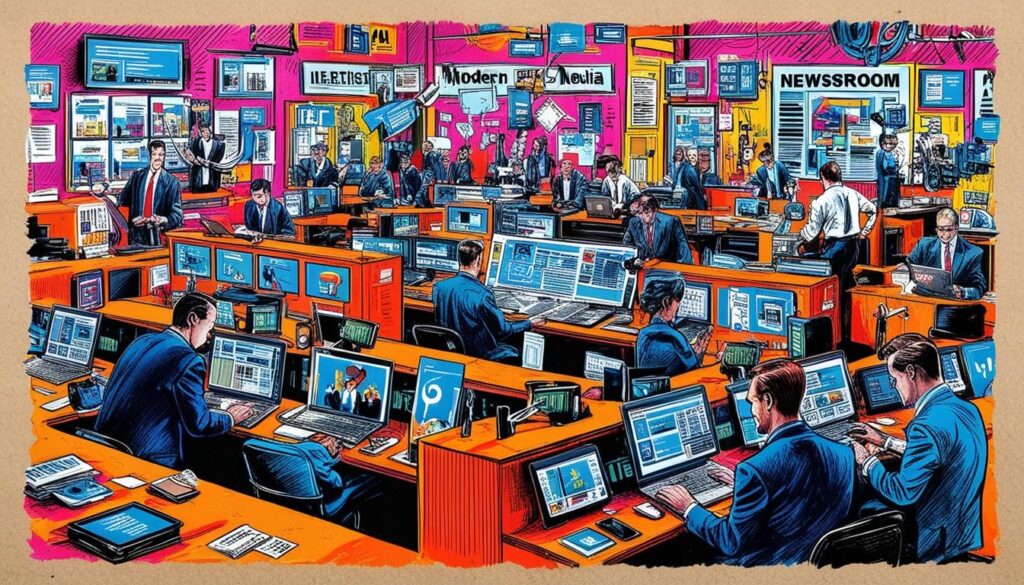Troels Behrendt Jørgensen discusses the challenges and opportunities faced by news publishers in a digital economy shaped by AI, highlighting the Danish publisher’s strategies for revenue generation and audience engagement.
Troels Behrendt Jørgensen, the digital director of Politiken, a leading Danish media corporation, shared insights on the evolution of the media landscape during an interview with digital media consultant Mark Challinor as part of The Drum’s News Horizons series. Jørgensen, who boasts over 25 years of experience in digital transformation and media strategy, discussed the various challenges and opportunities that await news publishers, particularly in the context of a digital economy increasingly influenced by artificial intelligence (AI).
At JP/Politikens Hus, which publishes a range of print and digital news outlets, Jørgensen reflected on the current state of the market. Politiken has achieved a remarkable presence, reaching over half of Denmark’s population weekly and experiencing earnings of 205 million Danish kroner (approximately $29.3 million) in 2023. Despite a general slowdown in the media sector after the pandemic, Politiken has maintained a “fundamentally sound business” with satisfied advertisers and subscribers. As Jørgensen noted, “The Nordic region is known for a high willingness to pay for media, but even here we’re seeing a more restrained interest in digital subscriptions compared to before.”
The discussion shifted to the financial structure of Politiken, where Jørgensen highlighted a significant transition towards content revenue. Roughly 80% of their revenue derives from content sales, while the remaining 20% comes from advertising. This shift underscores a broader industry trend where reliance on advertising revenue is diminishing in favour of digital subscription models.
AI’s influence in the media sector was a central theme during the conversation, with Jørgensen acknowledging the extensive investments made in industry-leading technologies and internal tools intended to enhance digital product development. “I have spent considerable time and resources building industry-leading technologies,” he stated, but he noted the industry is still awaiting breakthrough applications that can generate new revenue streams directly through these technologies.
In terms of the relationship with major tech platforms, Jørgensen described it as “strained,” although he pointed out the unique regulatory framework in Denmark, which safeguards publishers’ interests through the Danish Press Publications Collective Management Organisation (DPCMO). This organisation ensures that major tech firms, like Google and Facebook, compensate Danish media for their content usage.
The conversation also touched on the role of digital subscriptions in fostering reader engagement and monetisation. Jørgensen expressed his conviction that subscriptions are pivotal for driving future reader involvement and long-term sustainability across the business model, asserting, “the vast majority of our future business will and must lie in selling digital subscriptions.”
In the realm of brand building, Jørgensen indicated that maintaining the value of the established Politiken brand poses ongoing challenges in an evolving media landscape where social media algorithm changes have reduced the effectiveness of traditional brand-building methodologies. He highlighted the need for the company to invest more in marketing strategies and to engage more actively with their audience.
Jørgensen pointed out disparities in media consumption trends across various Nordic markets, noting significant advertising revenue drops in Norway and Sweden, in contrast to Denmark’s relatively mild losses. He described Politiken’s core demographic focus on urban, educated readers with higher household incomes, which provides an advantage in advertising revenue.
The advertising climate is undergoing rapid transformation, with revenues increasingly shifting towards tech giants and performance marketing. Politiken is adapting through digital transformation, focusing on native advertising and diverse platforms, including video and social media. Jørgensen mentioned that direct sales approaches offer advantages, particularly after Politiken exited the programmatic advertising realm, noting, “Since Politiken closed programmatic banner sales in 2021, our average CPM has more than doubled.”
As the dialogue concluded, Jørgensen expressed optimism about audio content, reflecting the company’s significant investment in podcasting and audio production as a means of enhancing subscriptions and audience engagement. He also acknowledged the challenges posed by the growing flood of AI-generated content, which intensifies competition for audience attention.
Overall, Jørgensen’s insights capture a media organisation navigating a complex and ever-transforming landscape, while illustrating the importance of adaptability and innovation in the quest for sustainability and engagement in the digital era.
Source: Noah Wire Services
- https://www.stibodx.com/resources/digital-beauty-and-the-workflow-to-support-it – Corroborates Troels Behrendt Jørgensen’s role in digital transformation and the use of innovative content types at Politiken.
- https://mediawatch.dk/Medienyt/Aviser/article17505459.ece – Supports the new design and strategies implemented by Politiken to increase subscriber retention and attraction.
- https://www.stibodx.com/resources/digital-beauty-and-the-workflow-to-support-it – Details the financial impact and engagement metrics of ‘super articles’ at Politiken, highlighting their role in driving sales and loyalty.
- https://www.altinget.dk/person/troels-behrendt-joergensen – Provides background information on Troels Behrendt Jørgensen’s experience and roles within the media industry.
- https://www.altinget.dk/christiansborg/person/troels-behrendt-joergensen – Confirms Jørgensen’s extensive experience in digital transformation and media strategy.
- https://mediawatch.dk/Medienyt/Aviser/article17505459.ece – Mentions the importance of visual storytelling and its positive impact on reader engagement at Politiken.
- https://www.stibodx.com/resources/digital-beauty-and-the-workflow-to-support-it – Explains the integrated workflow and digital beauty concept at Politiken, emphasizing the role of all content types in storytelling.
- https://politiken.dk/om_politiken/art5636597/Kontakt-Politiken – Lists the various departments and roles within Politiken, including Jørgensen’s position as Digital Director.
- https://www.stibodx.com/resources/digital-beauty-and-the-workflow-to-support-it – Highlights the significance of digital subscriptions and their impact on business sustainability at Politiken.
- https://mediawatch.dk/Medienyt/Aviser/article17505459.ece – Discusses the challenges and strategies related to maintaining and growing the Politiken brand in a changing media landscape.
- https://www.stibodx.com/resources/digital-beauty-and-the-workflow-to-support-it – Addresses the role of AI and technological investments in enhancing digital product development at Politiken.


